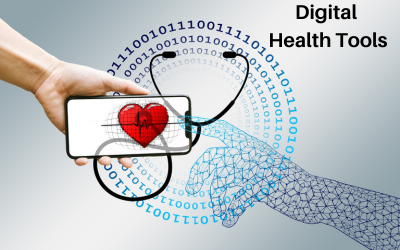Digital Health Tools and Their Implicated Uses in Behavioral Health and Addiction Treatment
December 20, 2019
by Nick Jaworski, Digital Community Builder of Circle Social, Inc.

As 2020 nears, we are seeing several trends in the healthcare industry. The use of cutting-edge technology has always been present, but never in the ways that we see today. While diagnostic equipment, computers, and other technology are essential, digital health tools are improving the client experience and helping clinicians and researchers alike to personalize care and improve patient outcomes. The same could be implied for both behavioral health and addiction treatment.
What Are Digital Health Tools and How Can They Help?
Digital health tools are tools that providers can use to reach clients outside the walls of the actual treatment facility. They can include clinical apps, virtual assistants, or remote patient monitoring devices such as wearable devices, sensors, and trackers that can be used to gather patient-generated health data.
As we move toward more telehealth and online programs in healthcare, behavioral health, and addiction treatment digital health tools can be instrumental in getting high-performance results. They enable a patient to take a more active role in their own health and treatment. Patients that are engaged at that level in their own treatment and results are more likely to have better outcomes and adhere to treatment.
As we move toward more value-based care systems, improving results and improving patient outcomes is a must. Because providers are taking on more risk by taking on patient outcomes, there need to be ways to connect and still work to resolve chronic conditions beyond the traditional doctor/patient care delivery.
Using digital health tools takes on a more whole person approach where the client can receive ongoing information and education on their medical condition and they can have a platform to reach out directly when they need to not just during a scheduled appointment. There are already several apps for addiction recovery on the market.
- Pear reSET from Pear Therapeutics is the first app approved by the U.S. Food and Drug Administration (FDA) to help treat substance use disorders. It's a specialized 12-week program that can only be prescribed by a clinician. It focuses on Cognitive Behavioral Therapy and offers rewards for completing different learning modules.
- Sober Grid allows you to create an online profile and interact, support, and engage with other people in recovery using a platform similar to Facebook. You can also use the app to create anonymous check-ins about whether you're sober or not, your mood, and what's going on. Unique to this app is a "daily quest", or some small thing you can do throughout the day to improve your mood.
- Nomo - Sobriety Clocks can be a great tool for people in recovery. The clock function can mark emotional turning points, and you have the choice of sharing any feelings of fear, joy, or shame that you are experiencing in the "encouragement" section of the app, which helps you feel less alone in your recovery. You can easily see your recovery clock which counts how long you have been sober. You can share the clock with family, friends, or other support systems, and you have the ability to message an accountability buddy if they feel the urge to use.
These are just a few apps available on the market. Use in a clinical setting could make a huge difference in recovery treatment outcomes. For instance, the Pear reSet app found that the app significantly improved treatment outcomes, including higher rates of abstinence -- 40.3% compared to 17.6% among those who did not use the app.
Application and Patient Risk
For the most part, Americans are extremely under-educated about how the healthcare system and insurance work. In a healthcare literacy test administered by Accenture, Managing Director Jean-Pierre Stephan reported that:
"More than half of a group of 10,000 people enrolled in health insurance coverage in the U.S. didn't know what coinsurance or deductibles were, or the difference between in- and out-of-network coverage. Almost all of those people who failed the test had a high-school degree and more than half had college or graduate degrees."
The whole idea surrounding the use of digital health tools is to streamline the client process, allow for faster and easier transfer of information, to improve patient engagement in their own medical care, and to improve patient satisfaction.
If, in the process of implementing digital health tools, consideration isn't taken for the people actually using the tools, it will only add to the stress and frustration of the users. As Gregory Brown, a divisional senior vice president at Health Care Service Corp. said:
"If you just automate the experience as it is today, you're just going to get a faster bad process. That's not what we're looking for. Redesign your process with your actual customer in mind first."
We also need to take care to remember that there is a person at the other end of this technology. Digital health tools are supposed to be there to enhance the client's experience. If they feel like they are being pushed to the side for electronics, that could also put a damper on the client encounter and make them less likely to want to engage with technology in the future. We need to make sure that we focus on what we know works and that is face-to-face interaction.
Cyber, Security, and Data Privacy Risk
Like anything electronic that is connected online, there is the risk of hacking, data mining, and other cybersecurity risks. In fact, in just the first half of 2019, we saw over 25 million patient records breached and those numbers have only grown.
And unfortunately for digital health tools, not all devices are protected equally. Many of the devices we use or wear every day like fitness and nutrition trackers, apps for sleep, meditation, or stress management were designed with the user in mind and security was an afterthought. Security is oftentimes retrofitted to the product after it has already been on the market!
Total security is just not a guarantee, but there are ways to mitigate the risks. Data leaks and hacks are now an everyday concern, so potentially any digital health tool could pose some risks. Though there are ways to lessen the risk, but some of these manufacturers are either 1) not required by law to implement security features or 2) don't have the capacity to react or proactively address these security flaws.
If used in a clinical setting, there needs to be patient protections in place so there is a minimal risk of security breaches. Any clinic or treatment center also needs to do their own due diligence to make sure that any digital health tools that are required to be HIPAA compliant actually are. According to the Omnibus Rule:
"An app like Runkeeper, or Fitbit, for example, where you're inputting data to chart your own health and fitness goals, wouldn't need to be HIPAA compliant. But if your app records, stores, manages or shares PHI for/with/on behalf of CEs, then HIPAA applies to you."
Clients also need to be aware of how their information is being collected, used, or sold to third-parties. Data privacy policies are not all the same, and may be buried under pages of legal jargon or may even inaccurately state how information is used.
As a technology-driven world, where most people carry around a minicomputer in their pocket or purse in the form of a smartphone, we need to be taking the utmost care to protect our privacy.
The smartphone is part of most people's daily lives and contains a treasure trove of information. Bank accounts, passwords, telephone number, address, photos, emails, credit cards, and now possibly our health information. A new favorite for hackers, we need to make sure that we and our clients are properly guarding our information.
Do the Benefits Outweigh the Risks?
Most would agree that the benefits do outweigh the risks. The FDA even released a statement on the risks of digital health tools. FDA Commissioner Scott Gottlieb, M.D. is quoted as saying:
"While we've been working to streamline the agency's oversight of digital health products that we regulate, we also know that there are many digital products consumers are using for their general wellness or to track their health information that aren't regulated as devices by the FDA."
The health care system is also increasingly relying on digital tools like electronic health records to advance patient care...While we believe that the benefits of these products generally outweigh the risks to patients, we still encourage consumers and health care providers who use these technologies to stay informed about the benefits and risks of these and any digital health products they are considering using or recommending for their patients.
In addition to the direct benefits of patient care, digital health tools are a gold mine for data that was previously unavailable. "Big Data", or the "tremendous quantities of health care data collected from patients and populations" has changed the way we manage, analyze, and leverage data.
If used properly, big data can be harnessed to advance prediction, performance, discovery, and comparative effectiveness of different treatments and outcomes. It would provide the research necessary to address the complexity of patients, populations, treatment centers, and other facilities.
The possibilities for shaping the way we think about healthcare and providing for patients are endless. The risk factors, however, always need to be considered when implementing any kind of digital health tool and what data is to be secured for clients.

A national membership association that provides education and advocacy for those in the behavioral health and addiction treatment industries.
We are the leading and unifying voice of addiction-focused treatment programs.



